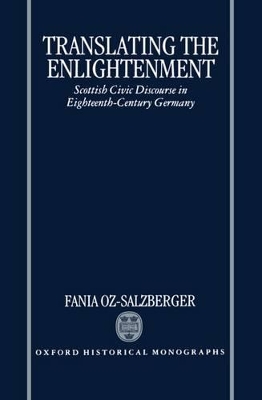Oxford Historical Monographs
1 total work
This is a study of the transmission of political ideas across languages and cultures, and in particular of a notably fruitful encounter between two distinct branches of eighteenth-century political discourse: the reception of Scottish civic ideas, developed most powerfully in the works of the Edinburgh historian-philosopher Adam Ferguson, by Geman intellectuals of the Enlightenment and Romantic eras.
Fania Oz-Salzberger's detailed and challenging analysis places Ferguson in the context of the Scottish Enlightenment, and explores the impact of his theories on German Enlightenment thinkers. She traces the passage of Ferguson's civic humanism across linguistic and cultural borders, and highlights the linguistic stumbling-blocks and conceptual tensions that resulted. Dr Oz-Salzberger argues that there resulted a complex and largely unintentional shift of Scottish civic concepts into a German
vocabulary of spiritual perfection and inner life, and that the misreading of Ferguson and other Scottish thinkers contributed much to the richness of German intellectual life in the late eighteenth and early nineteenth centuries.
Fania Oz-Salzberger's detailed and challenging analysis places Ferguson in the context of the Scottish Enlightenment, and explores the impact of his theories on German Enlightenment thinkers. She traces the passage of Ferguson's civic humanism across linguistic and cultural borders, and highlights the linguistic stumbling-blocks and conceptual tensions that resulted. Dr Oz-Salzberger argues that there resulted a complex and largely unintentional shift of Scottish civic concepts into a German
vocabulary of spiritual perfection and inner life, and that the misreading of Ferguson and other Scottish thinkers contributed much to the richness of German intellectual life in the late eighteenth and early nineteenth centuries.
